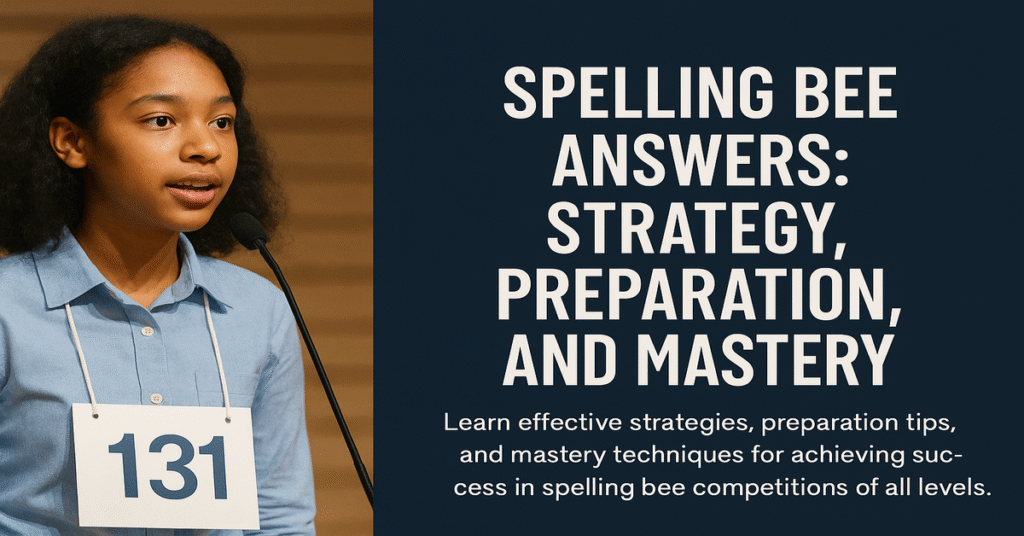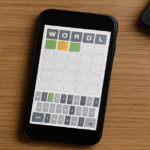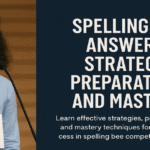Spelling bees have captivated audiences for decades, showcasing the intellect, memory, and perseverance of participants. Whether you’re a student preparing for your first competition, a parent supporting a child, or an educator looking to guide your students, understanding spelling bee answers — how they are learned, recalled, and mastered — is crucial.
This article explores every angle of spelling bee answers: their structure, learning techniques, historical evolution, and how they shape academic growth.
What Is a Spelling Bee?
The Origins of the Competition
The spelling bee traces its roots back to the early 19th century in the United States. It evolved from informal spelling contests held in schools, communities, and social gatherings. The concept was simple but challenging: participants had to spell increasingly difficult words correctly to stay in the competition.
How Modern Spelling Bees Are Structured
Today, spelling bees, particularly the renowned Scripps National Spelling Bee, involve rigorous rounds where participants spell words aloud after hearing them pronounced, defined, and used in a sentence. The format often progresses from preliminary written tests to oral spelling rounds and then to championship finals.
Why Spelling Bee Answers Matter
The Role of Vocabulary Mastery
Mastering spelling bee answers means understanding not just spelling, but the meanings, origins, and usage of words. This level of knowledge enhances language proficiency, critical thinking, and public speaking skills.
Building Mental Discipline
Spelling bees test mental agility and memory. Participants must retrieve precise information under pressure, which builds concentration, patience, and stress management skills beneficial in all areas of life.
Anatomy of Spelling Bee Answers
Word Difficulty Tiers
Spelling bee words are often categorized by difficulty levels:
- Elementary Level: Simple, commonly used words.
- Intermediate Level: Words with tricky spelling rules or less frequent usage.
- Advanced Level: Obscure words, often of foreign origin or highly technical vocabulary.
Origins and Etymology
Understanding the etymology of a word often provides crucial clues to its spelling. For example, words of Greek origin often include “ph” instead of “f,” and Latin-derived words frequently use “ct” as in “contact.”
Pronunciation Variations
Sometimes, pronunciation can lead contestants astray. Regional accents, slight tonal variations, and unfamiliar words require acute listening and familiarity with phonetic patterns.
Techniques to Master Spelling Bee Answers
Pattern Recognition
Many champion spellers recognize patterns in word endings, prefixes, and suffixes. Identifying common structures, such as “-logy,” “-tion,” “-ous,” etc., provides a mental template for spelling unfamiliar words.
Studying Word Origins
Diving into Greek, Latin, French, German, and Sanskrit roots arms contestants with tools to predict spellings of new or obscure words.
Breaking Words into Morphemes
Breaking a word into its smallest units of meaning (morphemes) simplifies learning. For example, “unbelievable” can be broken down into “un-” (not), “believe,” and “-able” (capable of).
Regular Practice and Mock Bees
Frequent practice through mock spelling bees simulates the competition environment. It conditions participants to spell under timed conditions, which is vital for real contests.
Tools and Resources for Spelling Bee Preparation
Word Lists
Official word lists like the Scripps Word Club and Merriam-Webster’s Spell It! provide structured guidance. Custom lists targeting weaknesses are also useful.
Dictionary Familiarity
Top spellers often spend hours reading and understanding dictionary entries, which improves vocabulary, comprehension, and spelling memory.
Apps and Online Platforms
There are various apps designed specifically for spelling bee training. These apps allow users to hear pronunciations, review definitions, and quiz themselves in a dynamic format.
Challenges Faced by Spelling Bee Participants
Word Ambiguity
Some words sound alike but have different spellings (“bare” vs. “bear”). Competitors must ask clarifying questions about meaning and usage.
Mental Pressure
The stress of competition can cause even the best-prepared participants to stumble. Mental conditioning and relaxation techniques are critical.
Language Evolution
English is a living language that continuously adopts new words. Keeping up with these changes adds complexity to preparation.
Historical Evolution of Spelling Bees
The First Spelling Bees
The earliest known spelling bee in the United States occurred in the early 1800s. Noah Webster’s Blue-Backed Speller was a staple tool for early competitors.
Rise of the Scripps National Spelling Bee
Founded in 1925, the Scripps Bee grew into an annual event that now attracts participants from all over the United States and abroad, supported by regional qualifying competitions.
Notable Champions and Their Strategies
Champions like Nupur Lala, Ananya Vinay, and Zaila Avant-garde have demonstrated diverse preparation styles — from exhaustive word memorization to focusing on patterns and etymology.
Psychological Aspects of Spelling Bees
Confidence Building
Competing in spelling bees can dramatically boost self-esteem and public speaking abilities.
Managing Anxiety
Techniques like deep breathing, visualization, and mindfulness exercises help participants remain calm and focused.
Motivation and Persistence
The journey to mastering spelling bee answers demands unwavering motivation, especially in the face of setbacks.
How Parents and Teachers Can Support Participants
Encouraging a Growth Mindset
Praising effort rather than innate talent helps students embrace challenges and persist through difficulties.
Providing Structured Practice
Setting up daily or weekly spelling drills, review sessions, and mock competitions provides necessary structure for steady improvement.
Emotional Support
Acknowledging the emotional toll and celebrating small victories helps sustain long-term motivation.
Spelling Bee Beyond the Competition
Academic Benefits
The skills developed through spelling bees transfer to other academic subjects, improving reading comprehension, writing, and even standardized test scores.
Career Skills
Spelling bee alumni often excel in fields requiring precision, such as law, journalism, medicine, and research.
Lifelong Love for Language
Many participants continue to explore languages, literature, and linguistics throughout their lives, inspired by their early spelling bee experiences.
Conclusion
Spelling bees are far more than simple contests; they are crucibles where young minds sharpen their linguistic prowess, build character, and discover the boundless world of words. Mastering spelling bee answers is a formidable but deeply rewarding pursuit that yields benefits well beyond the final round of any competition.
Success in spelling bees requires strategic preparation, psychological resilience, and a deep love of language. By understanding the roots, patterns, and nuances of words, anyone can become not just a great speller, but a confident communicator and lifelong learner.
FAQs
Q1: How are spelling bee words selected?
Words are chosen based on difficulty, etymology, and frequency of use. Official bees use curated lists that include a mix of common and obscure words.
Q2: What is the best way to study for a spelling bee?
The most effective method is a combination of learning word origins, recognizing spelling patterns, regular practice, and familiarizing oneself with dictionary usage.
Q3: Are spelling bee words always English?
No. Many words in spelling bees come from languages like Latin, Greek, French, German, and Hindi, reflecting English’s diverse linguistic roots.
Q4: What should I do if I don’t recognize a word during a spelling bee?
Ask for the word’s origin, definition, part of speech, and use in a sentence. These clues can often help deduce the correct spelling.
Q5: Can spelling bee skills help in other academic areas?
Yes, spelling bee preparation enhances vocabulary, reading comprehension, critical thinking, memory skills, and public speaking.
Q6: How early should one start preparing for a major spelling bee?
Serious preparation often begins a year or more in advance, especially for national-level competitions, but it’s never too early to start developing strong vocabulary habits.







